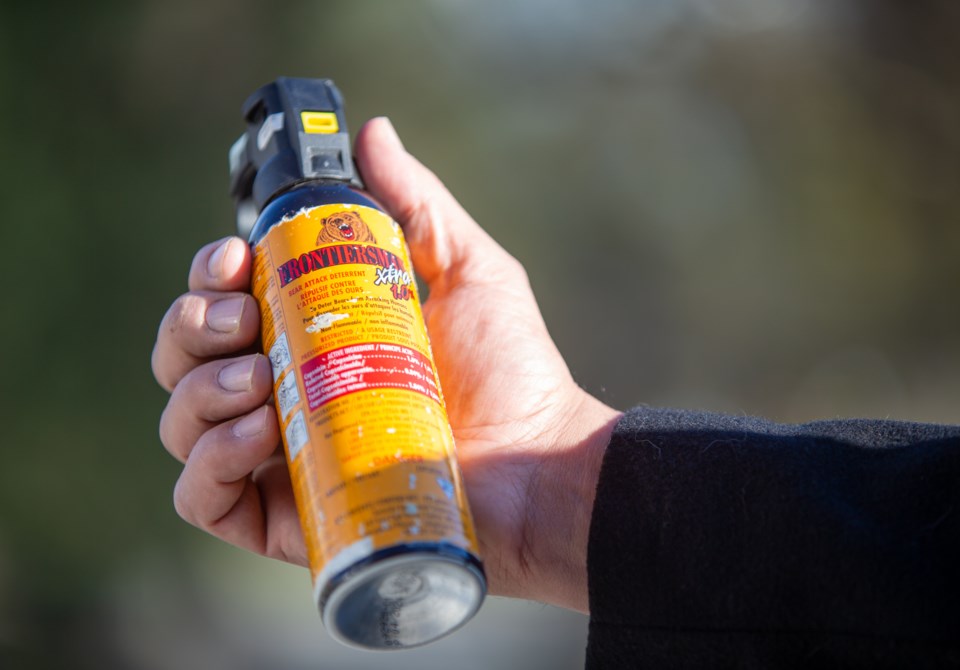Vancouver council was unanimous Tuesday in its vote to regulate the sale and display of bear spray in what is an effort to reduce the number of robberies, assaults and threats that have escalated in the city.
The move was based on a staff report that said Vancouver police recorded approximately 3,000 violent offences between 2018 and 2022 that involved bear spray, many of them committed by young people.
“It's being used for criminal activity, it's being used to intimidate people, it's being used to hurt people,” said Coun. Pete Fry in an interview prior to the council vote. “And at some point, we have to be a bit more proactive.”
The changes to the licence bylaw mean:
• No one under 19, or who cannot provide identification, can buy bear spray.
• Bear spray sellers must keep the spray in a locked or inaccessible area from the public.
• Retailers must record details of each sale, keep the record for 12 months and make it available upon request to the chief licence inspector to ensure bylaw compliance.
Council also agreed to amend the ticket offences bylaw, which allows the city to levy a fine of $1,000 for anyone who doesn’t comply with the new requirements.
Council decided not to impose an outright ban on bear spray, so adults who require the spray for its intended use — to ward off bears and wildlife while in the woods — can still buy it in Vancouver.
Two bear sightings in Vancouver since 2011
Unlike the Tri-Cities, North Vancouver and other areas of the Lower Mainland, bears are not a problem in Vancouver, where police report only two incidents over the past decade — a bear spotted on a garbage truck downtown in 2011, and another one wandering along train tracks near Gastown in 2021.
VPD data on assaults, robberies and threats show the total number of violent offences involving bear spray increased substantially since 2018, with significant increases from 2020 to 2022.
“Offences related to bear spray involving youth increased year-over-year during this time and more than doubled [121 per cent] in 2022 compared to 2018,” the staff report said.
“Youth numbers continued to rise in 2022, increasing by 15 per cent compared to the previous year. In comparison, bear spray offences involving adults spiked in 2020 and have decreased since that time.”
A separate report from police in October 2022 provided a possible explanation for the rise in young people using bear spray in crimes, saying there is growing evidence the pandemic “had an extraordinary emotional toll on young persons, and a lasting detrimental impact on their psychological and social well-being.”
Chilliwack sees 49% decrease in bear spray incidents
The police’s push for changes to the bylaws was largely driven by the number of incidents involving young people and the success Surrey and Chilliwack have had in decreasing the use of bear spray in crimes.
Those two cities and Port Coquitlam introduced regulations on the sale of bear spray in 1998, 2021 and 2022, respectively, that prohibited the deterrent’s sale to minors. Surrey and Chilliwack restrict the sale of bear spray to outdoor and sporting good stores, and have record and reporting requirements.
Like Chilliwack, Port Coquitlam requires retailers to display bear spray in a secure space, either locked or otherwise inaccessible to the public.
The report said data from Chilliwack RCMP indicated a 49 per cent decrease in the number of case files for incidents involving bear spray in 2021 compared to the previous year.
“Recent police data from Surrey indicates that their municipality experiences far fewer incidents involving bear spray annually compared to Vancouver, with 158 less violent offences in 2022,” the report said.
Fry said during discussion in the council chamber that the use of bear spray is not uncommon in Strathcona, where he lives. He questioned how the new regulations would stop someone from ordering bear spray online.
“I'm hopeful that this bylaw will limit the prevalence of bear spray on our streets,” he said.
“Let's see how it works. If not, I would be interested in seeing some kind of approach under the Offence Act to maybe enact a bylaw that could actually prohibit people from walking around the streets carrying bear spray in the City of Vancouver.”
'Very, very vicious attack'
Coun. Rebecca Bligh pointed out that while bear spray is used by criminals, innocent people worried about becoming a victim of a crime are also carrying the deterrent, which is a type of pepper spray, with an active ingredient — capsaicin — that’s derived from chili peppers.
“I know this firsthand that people carry bear spray because they are afraid on our streets, and they're afraid because of the prevalence of increased violence with other more deadly weapons,” said Bligh, who shared a story of witnessing a homeless person attacked with bear spray. “It was a very, very vicious attack.”
Council also directed Mayor Ken Sim to send a letter to the Minister of Environment and Climate Change Strategy to request a review of and amendment to the Integrated Pest Management Act and Regulation to designate bear spray as a restricted pesticide.
This designation would require sellers to obtain a provincial vendor licence subject to record and reporting requirements under provincial oversight and enforcement.
Sgt. Steve Addison, a VPD media relations officer, said in an email Tuesday that “while there are many legitimate reasons to buy and carry bear spray, we support realistic and pragmatic solutions that will prevent it from being possessed or carried for reasons contrary to public safety.”




